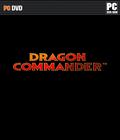Dragon Commander was one of the games that Larian Studios was showing off at E3 2012, and it showcased a few distinctly different gameplay elements fused together. On one hand, the game's campaign has a world map filled with territories that can get under your faction's control via the effective use of political scheming and flexing your military might. On the other hand, the battles are a similarly layered affair of RTS-style unit control with the added ability to fly around in a rocket-powered dragon. The game is a bit of an oddity in this marriage of gameplay elements, but the guys at Larian were more than happy to discuss how it all comes together.
You play as a dragon knight, the leader of your faction and the captain of a badass mother ship called the Raven. At the start of the presentation, we went over the Raven's functionalities, one of which was the ability to speak with your advisors. At numerous points, the advisors came to the player to offer advice on a decision, and as a result, the player received a card. The cards can be played to give you benefits in an upcoming battle, though they're also capable of providing other actions. Of course, these decisions can cause benefits and pitfalls in your relations with other factions or regions, so each must be weighed carefully.
At one point in the presentation, the player chose to divorce his elven wife and marry a dwarven maiden. Of course, this got him significantly better standing with the dwarves while pissing off the elves. As we looked around, there were a ton of potential love interests for both sexes on display, with each having their own background and benefits of marriage. This type of political maneuvering was also readily on display in the presentation, with choices made during a conversation with an advisor or diplomat affecting how the others would react. While all battles should be fought to win, it seems that you can be affected fairly significantly with the choices that you've made leading up to that point.
The developers showed us two battles, one in the campaign versus an AI opponent and another with two of the developers squaring off against each other in multiplayer. The campaign battle consisted of the developer and his forces fighting against another flying armada of warships. When not controlling your dragon, the view is set up in an overhead manner, allowing you to scan the battlefield and give orders to your units. Finally, after giving everyone rudimentary orders, the player jumped into the fray on his dragon and used the dragon's attacks and jet-powered mobility to mow down the enemy ranks. The dragon's jetpack also has the capability of slowing time, allowing the player to dodge enemy fire more easily.
The one-on-one multiplayer fight was a similar composition of units, only with two players adopting vastly different strategies. One player decided to play defensively and build both income-generating buildings as well as a battery of defensive turrets, while the other used much of his initial funding to spawn in a bunch of units. The resulting battle was of units on both sides slugging it out while the two developers began dogfighting on their dragons. The dragons are fairly vulnerable against other dragon attacks, and usually those battles were over fairly quickly, with the victor able harass the enemy units largely unopposed. The defeated player can respawn his/her dragon after a time, and in the interim, the player is completely reliant upon his/her units alone.
Some other tidbits of information about Dragon Commander were released, such as the support for four-player campaign co-op and the possibility of console releases, though such information was only speculative. Other aspects, such as controller support for the dragon fights, would seem to be a welcome addition as well. The mix of the fast-paced battles and the more cerebral political maneuvering looked like it could be a lot of fun. We should know more as the game leads up to its release early in 2013.
More articles about Dragon Commander













 Dragon Commander is a game of dragon combat, turn-based strategy and role-playing where you take on the role of the legendary first Dragon Knights, the most illustrious heroes in the history of the Divinity universe, commanding vast armies in your quest to conquer the empire.
Dragon Commander is a game of dragon combat, turn-based strategy and role-playing where you take on the role of the legendary first Dragon Knights, the most illustrious heroes in the history of the Divinity universe, commanding vast armies in your quest to conquer the empire.




























